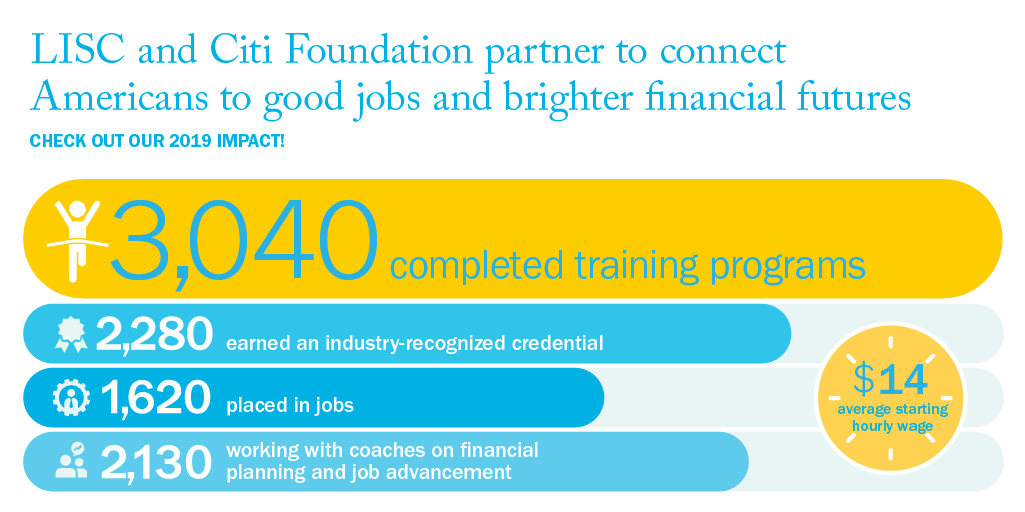Better Trained, Better Paid, Better Off: LISC CEO & Citi EVP Talk Job Training in USA Today
“It is time not only to invest more, but also invest differently, in the well-being of American workers, especially the significant pool of untapped talent that already exists,” said LISC CEO Maurice A. Jones and Citi EVP Ed Skyler in a joint op ed published in USA Today. They urge employers and nonprofits to look closely at the success of community-based Bridges to Career Opportunities programs as a model for helping unemployed and underemployed workers break down barriers to quality jobs, while helping businesses fill millions of open positions that they need for growth. Citi Foundation has partnered with LISC on a $10 million grant to fuel 40 Bridges programs across the country.
The below op-ed was originally published on USA Today:
Here's a solution to economic inequity: Invest more in job training
In urban and rural communities, record low national unemployment offers an unprecedented opportunity — one that could lift up millions of underemployed and sidelined workers, while helping employers attract the talent they need to fuel growth.
The challenge is to build the national urgency to take advantage of it. Too many communities still grapple with double-digit jobless rates, even as employers struggle to fill more than 6 million open positions. The economy needs broader, more diversified pathways to opportunity that cut across race, class, age and geography so people can build career paths and businesses can continue to innovate and grow.
To bridge this skills gap, it is time not only to invest more but also invest differently, in the well-being of American workers, especially the significant pool of untapped talent that already exists. To do so means breaking down the barriers that keep people from moving into high-opportunity fields, even with the support of traditional workforce development programs.
Increasingly, community-based organizations are doing just this — designing programs that not only directly train and connect workers to local opportunities, but also help them overcome personal obstacles and prepare them for sophisticated apprenticeship and licensing programs.

In Detroit, for example, the anti-poverty organization Focus: HOPE recently incorporated robotics training into its suite of technical employment and training services, opening doors to the expanding fields of automation and manufacturing.
In San Diego, the International Rescue Committee added solar panel installation to its existing lineup of training programs, connecting to a high-growth local industry that is experiencing a skilled labor shortage.
Wraparound services key to success
Initiatives like these are successful because they offer much more than just a job. They also provide wraparound services that address obstacles to success. For clients with low math or reading skills, for instance, they incorporate education programs that address the needs of specific local industries, so people can move into technical training programs that help them build more sophisticated skills.

Many offer services related to transportation, child care and housing for people who might not otherwise be able to participate in training opportunities. And, critically, they embed ongoing support from financial and employment coaches in everything they do, so workers can overcome unforeseen challenges and build their incomes, credit scores and savings as they build stable careers.
Design services to meet local needs
Our organizations, the Local Initiatives Support Corp. and the Citi Foundation, work closely with employers and nonprofits such as Focus: HOPE and the International Rescue Committee on new ways to educate, train and connect workers to good jobs and career paths. We’ve seen firsthand the value of this comprehensive approach, especially when delivered by community-based partners that tailor services to local economic conditions, as well as the rich culture of the local workforce.
In practice, this translates to a homeless woman in Houston who is able to get the help she needs to recover from domestic violence, find stable housing, move into a health care training program and be hired as a phlebotomist at a local hospital. Nationally, there are more than a million open jobs in the fast-growing health care field.
And in Chicago, a once incarcerated mom is able to improve her math skills, earn a GED diploma, qualify for training and apprenticeship programs and find a family-sustaining job as a welder — addressing what the American Welding Society predicts there will be a shortage of 375,000 welders over the next few years.
Imagine those success stories on a much larger scale, with for-profit and nonprofit enterprises collaborating to develop holistic initiatives. Employers can contribute their technical expertise and capital to fuel responsive training programs, and community-based organizations can leverage those resources to prepare a pipeline of untapped workers to fill good-quality jobs.
Together, we can catalyze vibrant, inclusive local economies that advance the interests of families, businesses and communities. The impact would be transformative.
Maurice A. Jones is president and CEO of the Local Initiatives Support Corp. Ed Skyler is executive vice president of Global Public Affairs, Citi.
Related

In 2018, Citi Foundation committed a historic $10 million grant to the Bridges to Career Opportunities program, which helps FOC participants gain industry-specific skills for living wage jobs and careers.